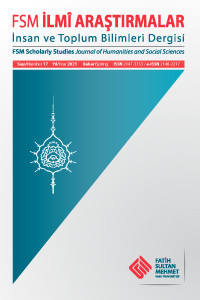Kur’an Kıssaları Bağlamında İki Bahçe Sahibi ve Arkadaşı
Kur’an-ı Kerim’de geniş yer tutan kıssalarda birçok konu işlenmiştir. Bu kıssalarda
yer alan mevzulardan birisi de dünya malıdır. İnsanın dünya malı ile imtihanı ise insanlık
tarihi kadar eskidir. Bu sınav, Kur’an-ı Kerim’de farklı ayetlerde dile getirilmiştir. Bu
ayetlerin ortak noktası, insan için yaratılan dünya malının bazı insanlar için araç değil
amaç haline gelmesidir. el-Kehf Sûresi 18/32-44. ayetlerindeki kıssa, dünya malı ilgili
ayetlerin hepsini kapsar niteliktedir. Bu ayet grubunda verimli, geniş araziye sahip bir
kişinin arkadaşına üstünlük taslamasından sonra malının helak olması anlatılmaktadır.
Kıssadaki kişiler, yer ve zaman müphem olduğundan aynı kıssanın herhangi bir zaman
diliminde herhangi bir yerde tekrar yaşanması muhtemeldir.
Bu çalışmada ilgili ayetlerdeki kıssayı müstakil olarak incelenmeyi uygun gördük.
Çalışmamızı yaparken önce kıssanın tanımını yaptık. Sonrasında hem Mushaf sıralamasına
hem de olayın zaman sürecine uygun olarak ayetleri tahlil etmeye çalıştık. Bu araştırma
esnasında konuyu açıklayıcı ayet ve hadislerden yararlandık, tefsir kaynaklarına
başvurduk, kelime açıklamalarında ise sözlüklerden istifade ettik.
Anahtar Kelimeler:
Tefsir, Kur’an-ı Kerim, el-Kehf Sûresi, kıssa, imtihan
In the Context of Quranic Parables: The Tale of the Man with Two Gardens and His Friend
In the Qur’an, many subjects are covered in the stories. One of the subjects in these
stories is worldly goods. The test of man with world property is as old as the history of
humanity. The test of man with worldly goods is as old as human history. The common
point of these verses is that the worldly goods created for humans turn out not as means
but as an end for some people. In Surah al-Kahf 18/32-44, the parable covers all the
related verses of worldly property. In this group of verses, the destruction of the property
of a person with a fertile, large land after he claims superiority over his friend is narrated.
Since the people, place, and time in the parable are ambiguous, it is possible that the same
parable may happen again in any place at any time.
In this study, we found it appropriate to examine the parable in the relevant verses
separately. While doing our study, we first defined the parable. Afterwards, we tried to
analyze the verses in accordance with both the order of the Mushaf and the time course of
the event. During this research, we benefited from explanatory verses and hadiths, applied
consulted tafsir sources and used of dictionaries for word explanations.
Keywords:
Tafseer, Holy Quran, Surah al-Kahf, parable, challenge,
- ISSN: 2147-3153
- Başlangıç: 2012
- Yayıncı: Fatih Sultan Mehmet Vakıf Üniversitesi
Sayıdaki Diğer Makaleler
Kur’an Kıssaları Bağlamında İki Bahçe Sahibi ve Arkadaşı
Popüler Kültür ve Tasarım İlişkisi Ekseninde “Piyasa” İçin Siyer/ Siyer Konulu Romanlar
Ni’metullâhiyye Tarîkatına Yönelik Farsça Bir Tarîkatnâme: Tarîka Fî Âdâbi’s-Sülûk
Taş Üstüne Yazı Yazmak: Osmanlı’da Matbaa Hattatlığı (1831-1928)
Evliya Çelebi, Das Reisebuch: Die Welt zwischen Wien und Mekka
Evliya Çelebi Seyahatnâme’sinde Tılsımlar
İbrahim Gökşin BAŞER, Melek ASTAR, Gaye SALTUKOĞLU
Veliaht Abdülmecid Efendi’nin Sofrasından Son Dönem Osmanlı Saray Mutfak Kültürü
